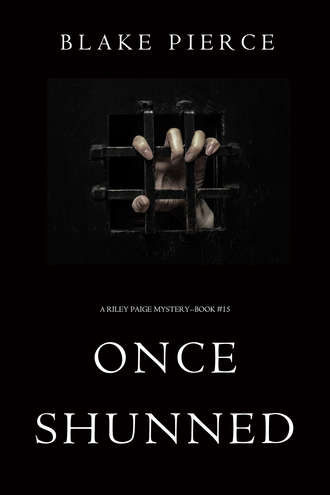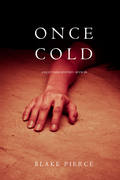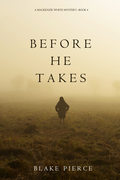
Блейк Пирс
Once Shunned
Then it occurred to her …
An iceman used to make his regular rounds here.
She imagined the bulky cart carrying loads of ice, and the strong man who hauled the blocks to front doors with iron tongs. In those days, every housewife who had lived here owned an ice pick that she put to perfectly innocent use.
But the town had experienced a bitter loss of innocence the night before last.
Times have changed, Riley thought. And not for the better.
CHAPTER THREE
Riley’s nerves quickened as Agent Sturman parked the van in front of a little house in a well-kept neighborhood. This was where Robin Scoville had lived, and where she had died at the hands of a killer. Riley always felt this heightened alertness when she was about to visit a crime scene. Sometimes her unique ability to get into a twisted mind would kick in where the murder had taken place.
Would that happen here?
If so, she wasn’t looking forward to it.
It was an ugly, unsettling part of her job, but she had to use it whenever she could.
As they got out of the van, she noticed that the house was the smallest in the neighborhood—a modest one-story bungalow with a compact yard. But like all the other properties on the block, this one was immaculately painted and maintained. It was a picturesque setting, marred only by the yellow police tape that barred the public from entering.
When Riley, Jenn, Bill, and Agent Sturman entered through the front gate, a tall, uniformed man stepped out of the house. Agent Sturman introduced him to Riley and her colleagues as Clark Brennan, Wilburton’s police chief.
“Come on inside,” Brennan said in an agreeable accent similar to Sturman’s. “I’ll show you where it happened.”
They walked up a long wooden ramp that led to the porch.
Riley asked Brennan, “Was the victim able to move around independently?”
Brennan nodded and said, “Her neighbors say she didn’t much need the ramp anymore. After the car accident last year, her left leg was amputated above the knee, but she was getting around really well on a prosthetic limb.”
Brennan opened the front door, and they all entered the cozy, comfortable house. Riley noticed no further signs that anybody disabled had lived here—no special furniture or handholds, just a wheelchair tucked away in a corner. It seemed obvious that Robin Scoville had prided herself on living as normal a life as she possibly could.
A survivor, Riley thought with bitter irony.
The woman must have thought she’d endured the worst hardships life could throw at her. She’d surely had no idea of the grim fate that awaited her.
The small, tidy living room was furnished with inexpensive furniture that looked rather new. Riley doubted that Robin had lived in this house for very long. The place felt transitional somehow, and Riley thought she might know why.
Riley asked the police chief, “Was the victim divorced?”
Brennan looked a little surprised at the question.
“Why, yes,” he said. “She and her husband broke up earlier this year.”
It was just as Riley had suspected. This place seemed much like the little house where she and April had lived after her marriage to Ryan ended.
But Robin Scoville’s challenge had been much greater than Riley’s. She’d had to put both a divorce and a crippling accident behind her as she’d tried to start life anew.
A taped outline on the hardwood floor showed the position of the body. Brennan pointed to a small, dark stain on the floor.
“She’d bled from the ear just a little. Perfectly consistent with a cerebral hemorrhage. But because of the recent Cranston murder, the ME got suspicious right away. And sure enough, his autopsy showed that Robin was murdered in the same way as Cranston.”
Riley thought …
The same method, but such different circumstances.
And she knew that any differences were likely to prove as important as similarities.
She asked Brennan, “Were there any signs of a struggle?”
“None at all,” Brennan said.
Sturman added, “It looked like she was taken by surprise, attacked swiftly from behind.”
Bill asked, “Was she wearing her leg prosthesis at the time of her death?”
“No,” Brennan said. “She was using her elbow crutches to get around.”
Riley knelt down and examined the position marked by the body tape. She had fallen right in front of the window. Robin had most likely been struck while she was looking out the window.
She asked Brennan, “What was the estimated time of death?”
Brennan said, “Around four in the morning.”
Riley stood and looked through the window at the calm, pleasant street and wondered …
What was she looking at?
What had been going on in the neighborhood at such an hour that might have caught Robin’s attention? And did it matter one way or the other? Did it have anything to do with her actual killing?
Riley asked, “How was her body found?”
Brenan said, “She didn’t show up the next morning for her job as an editor at a local literary magazine. And she wouldn’t answer her boss’s phone calls. He found that to be strange and worrisome, not like her at all. He was worried that maybe she’d had some kind of an accident on account of her disability. So he sent an employee to her house to check on her. When she didn’t answer the door, the employee went around behind the house and found that the back door had been broken into. He came on inside the house and found the body and called nine-one-one.”
Riley stood there for a moment, still wondering what Robin might have been looking at outside.
Had something happened out there that awakened her and brought her to this spot?
Riley had no idea.
Anyway, what the victim had experienced just before her death was of markedly less interest to Riley than what had been going on in the mind of the killer. She hoped maybe she could get a hint of that while she was here.
“Show us where the killer broke in,” Riley said.
Brennan and Sturman led Riley and her colleagues through the little house to a door that opened onto stairs to the basement. Near the top of the stairs was a landing from which another door opened onto the backyard.
Riley saw right away that the pane of glass nearest the dead bolt and the doorknob had been broken. The killer had obviously broken the glass and reached through the frame and unlocked and opened the door.
But Riley noticed something else that struck her as important.
Pieces of contact paper were stuck to the shards that remained in the frame.
Riley carefully touched a shard with some paper on it.
The killer had carefully placed the contact paper on the pane, hoping not to make too much noise, but also …
Maybe he didn’t want to make too much of a mess.
Riley shivered at a sudden near-certainty.
He’s fastidious.
He’s a perfectionist.
It was the sort of sharp flash of intuitive insight she’d been hoping for.
How much more could she learn about the killer right here and now?
I’ve got to try, she thought.
CHAPTER FOUR
As Riley mentally prepared to reach into a killer’s mind, her eyes met with Bill’s for a moment. He was standing with their other colleagues, watching her. She saw Bill nod, obviously understanding that she wanted to be alone to do her work. Jenn smiled a little as she, too, seemed to pick up on Riley’s intention.
Bill and Jenn turned and led Sturman and Brennan back into the house, shutting the basement door behind them.
Alone on the little landing, Riley looked again at the broken window. Then she walked outside, pushed the door shut, and stood in the well-kept little backyard. There was an alley just beyond the picket fence at the edge of the yard.
Riley wondered—had he approached from the alley?
Or had he slipped around from the front, between Robin’s house and one of her neighbors’ homes?
The alley, probably.
He might have parked a vehicle on a nearby side street, walked down the alley, and slipped quietly through the back gate. Then he’d crept through the narrow yard straight to the back door and …
And then?
Riley took a few long, slow breaths to ready herself. She carefully visualized how the backyard must have looked at that hour of morning. She could imagine the sound of crickets and could almost feel the pleasant, cool air of a September night. There would have been some glow from the streetlights but probably little light from the houses themselves.
How had the killer felt as he’d readied himself for his task?
Well prepared, Riley thought.
After all, he’d obviously picked out his victim in advance, and he would have known a few crucial things about her, including the fact that she was an amputee.
Riley looked again at the broken pane of glass. Now she could see that the contact paper had been cut almost exactly to the shape of the windowpane. That surely meant he’d stood right here and cut the paper to fit even in the dim light, probably with a pair of scissors.
Again that word flashed through Riley’s mind …
Fastidious.
But more than that, he’d been calm and patient. Riley sensed that the killer had been utterly dispassionate—not the least bit angry or vengeful. Whether he’d known the victim personally or not, he’d harbored no feelings of animosity toward her. The killing had been cold-blooded in the fullest possible sense.
Almost clinical.
She made a fist and imitated the gentle but firm blow he must have used to break the glass. Before she reached through the broken pane, she suddenly sensed a spasm of discomfort.
Did he make more noise than he’d expected?
She remembered seeing a shard of glass lying on the floor inside the door. A piece had fallen despite the care he’d taken, causing a tinkling sound.
Had he hesitated?
Had he considered giving up on his plan and quietly slipping away the way he’d come?
If so, he’d quickly regained his resolve.
Riley gingerly reached through the pane and reopened the door and stepped onto the landing, slipping her shoes off as he surely had in order to move about quietly.
And then …
He’d heard a noise upstairs.
Sure enough, the woman had awakened at the sound, and he could hear clattering and thumping as she put on her elbow crutches and started moving through the house.
Riley thought maybe his hopes had sunk for a few moments.
Maybe he’d hoped to creep up on Robin as she lay in bed fast asleep, then drive the ice pick into her ear without her ever knowing he’d been there.
It wouldn’t be like the earlier killing, when he’d murdered young Vincent Cranston while he’d been jogging outdoors. But Riley sensed that the killer had no interest in a consistent MO. All he wanted was to get the killings done as cleanly and efficiency as possible.
But now …
With the woman on the move upstairs, did he dare continue?
Or should he run away before she came back here and found him?
Riley sensed that he froze here on the landing for a moment, struggling with his indecision.
But then …
The woman didn’t come to the back door. She moved on elsewhere in the little house. Maybe she hadn’t heard the glass breaking after all. The killer might have breathed a little easier at the realization, but he still wavered. Did he dare attack the woman while she was up and around?
Why not? he may have wondered.
Disabled as she was, he’d surely be able to overpower her much more easily than he had his earlier victim.
Still, he didn’t want to be sloppy or careless. A struggle might spoil everything.
But he reminded himself that this was urgent business. He was driven by some deep imperative that only he could understand.
He couldn’t back out—not now. When would he get another chance like this?
He summoned up his will and decided to get on with it.
Following in what she imagined to be the killer’s footsteps in her stocking feet, Riley climbed the steps up to the door that led to the kitchen. She turned the doorknob and tugged the door open …
Perfect!
The doorknob didn’t squeak, and neither did the door hinges.
Feeling more and more connected to the killer by the moment, Riley crept on into the kitchen. Ignoring the fact that Bill, Jenn, Sturman, and Brennan were all standing nearby watching her, she looked all around. She knew that the scene had been untouched since the murder. So the same as right now, the kitchen table had been piled with stacks of paper that the woman had been reading.
But where was the woman?
Riley imagined looking through the killer’s eyes, peering through the kitchen archway into the living room. Sure enough, she was standing right there, looking out the window, her attention entirely directed toward whatever she saw outside.
Riley imagined taking the ice pick in hand. Then she walked on across the hardwood floor, her shoeless feet stirring not so much as a whispering shuffle, until she stood right behind where Robin Scoville had been standing.
And then …
One swift, sharp, flawlessly aimed move was all it took.
The long point of the ice pick plunged effortlessly through the boneless passage through her ear into her brain, and the killer pulled the pick just as effortlessly out again, then watched his victim collapse to the floor.
And finally …
Riley felt sure that he was satisfied with his deed.
He was proud of himself for overcoming his uncertainties and going through with it.
But did he pause for a moment to admire his own handiwork?
Or had he slipped away immediately?
Riley’s sense of the killer’s mind dimmed now as she stood looking again at the taped outline on the floor.
There was a lot—too much—that she still didn’t know.
But she felt sure of one thing.
She said aloud to her colleagues, who were now gathered around her …
“He’s one cold son of a bitch.”
Bill said, “Tell us more.”
Riley thought for a moment, then said, “I can’t be sure of anything yet. But I think it’s personal for him—and yet it’s not personal at the same time. I don’t think he hated this woman. He may not have even known her name. But he had reasons for wanting her dead—important reasons, almost like killing her was some kind of …”
Riley paused, trying to think of the right word.
Then Jenn suggested, “Duty?”
Riley looked at her younger colleague and nodded.
“Yeah, that’s exactly the feeling I get. A sense of obligation, almost.”
Riley noticed now that Chief Brennan was staring at her with his mouth hanging open. She’d long since gotten used to people’s surprise when they watched her going through this strange process of hers. And she knew she’d just looked pretty strange, walking trancelike through the house in her socks, pantomiming the moves of the killer.
Agent Sturman, by contrast, didn’t look surprised at all. Of course, as a seasoned FBI agent, Sturman had surely at least heard of Riley’s unique propensities, which were well-known throughout the Bureau.
Sure enough, Sturman nudged Brennan with his elbow and said, “I’ll explain it later.”
Bill had gone to the landing in back of the house. He now came back with Riley’s shoes and handed them to her. As Riley sat down on a footstool and put them back on, doubts started to creep into her mind.
Did I get everything wrong?
She often felt swept with such uncertainties after these exercises.
After all, she wasn’t a mind reader, and there wasn’t anything magic or paranormal about the process she used. It was pure intuition, nothing more or less. She’d been wrong sometimes in the past, and she might be wrong now.
She got up from the footstool and wondered …
Did I miss something?
She looked toward the window and imagined the young woman standing there staring outside, oblivious to the danger that was creeping up behind her.
What was she looking at?
Riley had no idea.
But she knew she’d better find out.
CHAPTER FIVE
Riley stood looking out the window, trying to imagine what the street had looked like in the early morning hours, at the exact moment when someone had driven an ice pick into Robin Scoville’s skull.
What was out there? she wondered.
What did Robin see just then?
The question nagged harder at Riley by the moment.
She said to Chief Brennan, “I didn’t notice that this house has any security cameras. Does it?”
“No,” Brennan said. “The owner didn’t bother to install them in a small rental like this. Too bad, because maybe we’d have a video recording of what happened. Or better yet, cameras might have deterred the killer.”
Followed by her colleagues, Riley walked out through the front door. She stood on the sidewalk looking up and down the street. Again she noticed that Robin’s house was the smallest house in an upscale neighborhood.
She said to Brennan, “I assume you’ve interviewed all the neighbors.”
“As many of them as we could,” Brennan said. “Nobody was awake when it happened, so nobody noticed anything unusual.”
She could see cameras on some of the front porches. In several yards, signs warned that these houses were protected by one or another security company.
“I see that some neighbors have security cameras for their own houses,” Riley commented.
“Most of them do, I’m sure,” Brennan said with a shrug. “But it doesn’t look like any of them are going to do us any good.”
Riley could see what Brennan meant. None of the cameras appeared to be directed toward Robin’s house, so they couldn’t have picked up anything concerning the break-in or the murder. And yet a Nest camera fastened to a porch post of the nearest house caught her interest.
Riley pointed to the house and said, “Have you talked to the people who live there?”
Brennan shook his head. “No, a retired couple named Copeland live there, but they haven’t been at home for a week or so. The neighbors say they’re vacationing in Europe. They’re supposed to come back in a couple of weeks. So they definitely couldn’t have seen what happened. And their camera isn’t aimed at Robin’s house either.”
Not at the house, Riley thought. But definitely at the street in front of the house.
And what had happened on the street was exactly what Riley was curious about right now. Because the couple was gone for an extended time, maybe they’d left the surveillance system programmed to keep a continuous record of all that happened in their absence.
Riley said, “I want to see what, if anything, that camera picked up.”
Agent Sturman replied, “We’ll have to track down the Copelands and get their permission. To see the recording we’ll need their password. Or we’ll have to get a warrant and go after it through the company.”
“Do it,” Riley said. “Whatever we need. As quickly as you can.”
Sturman nodded and stepped aside, taking out his cell phone to make a call.
Meanwhile, before Riley could decide what she and her colleagues should do next, Jenn spoke to Chief Brennan.
“You said Robin was divorced. What can you tell us about her ex?”
Brennan said, “His name’s Duane Scoville, and he plays in a local rock band called the Epithets.” The chief laughed a little and added, “I’ve heard them play. They’re not bad, but it seems to me they’d better keep their day jobs.”
Jenn asked, “Where does Duane live?”
Brennan pointed. “Just over on the east side of town.”
Jenn said, “I take it you’ve interviewed him.”
“Yeah, we don’t think he’s a viable suspect,” Brennan said.
“Why not?” Jenn asked.
“Duane says he and the Epithets were playing a gig over in Crestone, Rhode Island, the night of Robin’s murder. He says he and the band stayed the night, and he showed us a motel receipt. We don’t have any reason not to believe him.”
Riley saw that Jenn looked doubtful.
And with good reason, Riley thought.
It didn’t sound like the local police had done a very thorough job of interviewing Duane Scoville, let alone eliminating him as a suspect. And even if Duane wasn’t the murderer, he still might have important information to offer.
Jenn said, “I’d like to talk to him some more.”
“OK, I’ll give him a call,” Brennan said, reaching for his cell phone.
“No, I’d rather not give him advance notice,” Jenn said.
Riley knew that Jenn was right. If there was even the slightest chance that Duane was their killer, it was best to try to catch him off guard.
Riley said to Brennan, “Could you drive us to where he lives, see if we can find him at home?”
“Certainly,” Brennan said.
Agent Sturman ended his phone call and rejoined them. “I’ve got an agent tracking down the Copelands,” he said. “But I’ve got another case in progress, and I need to get back to headquarters.”
“You’ll let us know as soon as you get anything?” Bill asked.
“Absolutely,” Sturman promised, and strode off toward his van.
Chief Brennan said, “My vehicle is over here. I can take you to Duane Scoville’s place.”
As Riley and her colleagues climbed into Brennan’s police car, Riley noticed the determined expression on Jenn Roston’s face. It felt good for Riley to see her young protégé looking so engaged. Riley glanced at Bill and could tell that he felt the same way.
She’s really turning out to be a hell of an agent, Riley thought.
And the three of them together were becoming a remarkable team.
She decided she and Bill should let Jenn take the lead in interviewing Duane Scoville. It might give her a chance to shine, Riley figured.
And she definitely deserves that.
*
During the short drive across town, Jenn Roston found herself remembering Riley’s actions back at Robin Scoville’s house, and the conclusion she’d drawn about the killer …
“He’s one cold son of a bitch.”
Jenn didn’t doubt that Riley was right. She’d seen Riley get into a killer’s mind a number of times now, but it never ceased to amaze her.
How does she do it?
No one in the BAU seemed to know, except maybe for Riley’s one-time mentor, a retired agent named Jake Crivaro who now lived in Florida. Riley herself didn’t seem to be able to explain the process or even what it felt like.
It seemed to be nothing more or less than pure gut instinct.
Jenn couldn’t help but envy Riley for that.
Of course, Jenn had her own share of strengths. She was smart, resourceful, tough, ambitious …
And nothing if not self-confident, she thought with a smile.
Right now she was pleased that Riley had agreed with her about the need to interview Duane Scoville. Jenn felt anxious to make meaningful contributions to solving this case. She regretted some of her own behavior during the previous case she’d worked on with Riley and Bill—the case of the so-called “Carpenter,” who’d killed his victims with a swift hammer blow to the head.
A bitter remark Jenn had made in response to Riley’s criticism kept echoing through her mind …
“I suppose this is where you accuse me of not being objective.”
It had been a cheap shot—especially since Jenn knew perfectly well that Riley had had good reason to doubt her objectivity. As an African-American agent, Jenn had been on the receiving end of some pretty overt racism while they’d been working in Mississippi. She hadn’t taken it well, and she had to admit it had affected her judgment.
She hoped she could make up for all that now.
She hoped she could make up for a lot of things.
She looked forward to a day when, at long last, she could put her troubled past behind her.
As Chief Brennan drove, darker memories began to crowd into Jenn’s mind—the dysfunctional parents who’d abandoned her when she’d been a child, then her years under the care of a brilliant but sinister foster parent who called herself “Aunt Cora.” Aunt Cora had trained Jenn and her other foster children to become master criminals in her own criminal network.
Jenn had been alone among Aunt Cora’s pupils in escaping from her clutches, hoping to make a different and better life for herself. She’d become a decorated cop in Los Angeles, then had made phenomenal scores at the FBI Academy before becoming a full-fledged BAU agent.
Even so, she hadn’t been able shake off Aunt Cora completely. The woman had been in touch with her earlier this year, trying to pull her back into her sphere of influence, even trying to make Jenn beholden to her by helping out on an FBI case.
Jenn hadn’t heard anything from Aunt Cora for a few weeks now. Had her one-time mentor given up on her for good?
Jenn could only dare to hope.
Meanwhile, Jenn’s gratitude toward Riley knew no bounds. Riley was the only person who knew the truth about Jenn’s past. More than that, Riley sympathized. After all, Riley herself had once been entangled with a criminal mastermind, the brilliant escaped convict Shane Hatcher.
Jenn knew more than anybody else did about Riley’s secret, just as Riley knew all about hers. It was one of the reasons Jenn felt such a close bond with her new mentor—a bond based on mutual understanding and respect. Because of that bond, Jenn wanted to live up to Riley’s high expectations of her.
Jenn’s thoughts were interrupted by the sound of Brennan’s voice as he turned a corner.
“We’re almost there.”
Jenn was surprised to see a huge change in the surrounding community. Gone were all the dignified, gleaming white houses with their flawlessly straight picket fences. They passed down a street littered with modest-sized businesses that included vegan restaurants, organic food stores, and a thrift store.
Then they continued into a neighborhood filled with smaller houses, somewhat shabby but nevertheless rather charming. Pedestrians were a varied lot, from young bohemian types of diverse races to old hippie types who looked like they’d lived here since the sixties.
Jenn felt immediately more comfortable here than she had in the homogenized, ultra-white, upper-class area they’d just left. Still, this was a small neighborhood, and Jenn guessed that it was getting rapidly smaller.
Gentrification is closing in, she thought a bit sadly.
Brennan parked in front an old brick apartment building. He led Jenn and her colleagues up to the front door. There, Riley gave Jenn a look that told her she was to take the lead now.
Jenn glanced at Bill, who nodded at her to go ahead.
She gulped with anticipation, then rang the buzzer for Duane Scoville’s apartment.
No one answered at first. Jenn wondered if maybe he wasn’t home. Then she rang again and heard a grumbling voice over the speaker.
“Who is it?”
The voice crackled for only a couple of seconds. But Jenn thought she heard music in the background.
Jenn called back, “We’re from the FBI. We’d like to talk to you.”
“What about?”
Jenn felt a bit taken aback by the question. And this time she was sure she heard music.
She said, “Um … about your ex-wife’s murder.”
“I talked to the cops about that already. I was out of town when it happened.”
There was another snippet of music, and this time it sounded familiar to Jenn—almost eerily so.
Brennan interjected, “This is Police Chief Brennan. I talked with you earlier. The agents would still like to ask a few more questions.”
A silence fell, then the buzzer rang and the door clicked. Jenn opened the door and she and her colleagues walked inside.
She thought …
It doesn’t sound like we’re exactly welcome.
Jenn wondered why not.
She decided she was going to find out.







